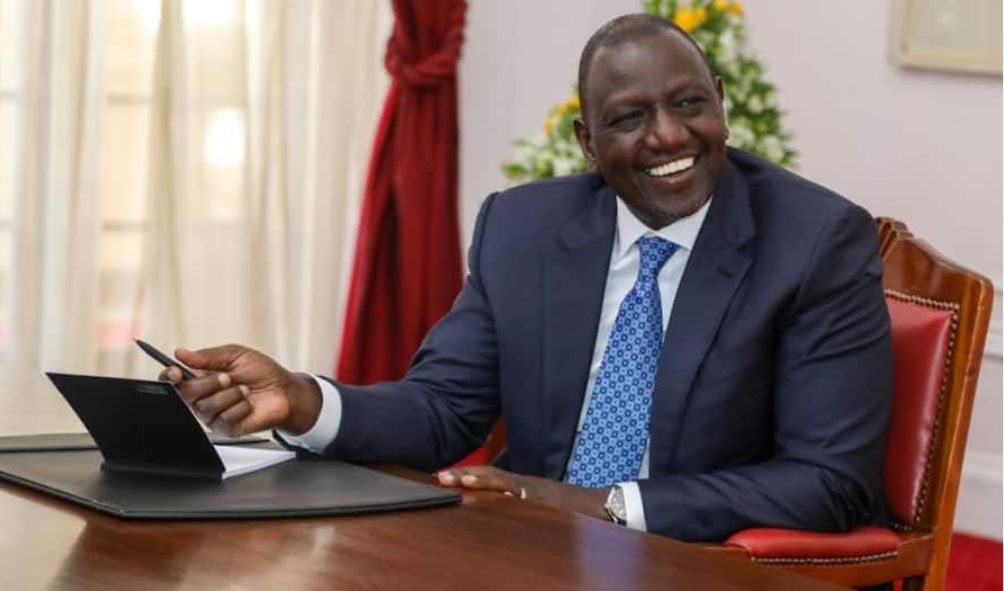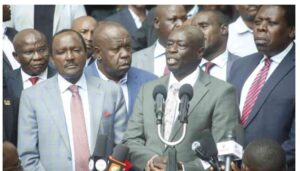Ruto changes Uhuru budget, increases recurrent expenditure by KSh87.6bn

Ruto increases the government's recurrent expenditure by Sh87.57 billion as he reorganizes the budget inherited from the Uhuru administration
Ruto increases the government’s recurrent expenditure by Sh87.57 billion as he reorganizes the budget inherited from the Uhuru administration.
While his administration reorganizes the budget plan it inherited from the Uhuru administration, President William Ruto’s administration has increased the budget for the daily operations of the national government by Sh87.57 billion.
Recurrent expenses have been increased from the previous maximum of Sh1.18 trillion established by the previous regime to Sh1.27 trillion for this fiscal year ending in June, according to official figures released on Friday by Treasury secretary Njuguna Ndung’u.
The revised expenditure estimates follow the approval and signing into law of the supplementary budget earlier in the month.
The increased budget on administration, operation, and maintenance as well as salaries and wages comes months after Ruto pledged to cut the recurrent budget by as much as Sh300 billion.
His administration has, however, maintained it inherited Sh279.26 billion in non-debt payments which were either carried over from the previous financial year ended June 2022 or unbudgeted like the Sh20 billion Hustler Fund.
The carried-over obligations, the Treasury told the International Monetary Fund (IMF) in their last routine review meeting, have piled pressure on government expenditures, slowing down the implementation of the fiscal consolidation programme.
Non-debt payments amounting to Sh88.66 billion were deferred from last financial year, while Sh61.02 billion bills which were incurred earlier this fiscal year — including Sh26.09 billion for fuel, maize flour, and fertiliser subsidies ahead of the hotly-contested August presidential poll— were not in the budget.
“Remaining pressures [Sh130 billion] are mainly related to the July and August pause in fuel price adjustments, July’s temporary introduction of a maize flour subsidy, unavoidable drought emergency interventions, and the launch of new initiatives from our administration, including plans to support agricultural production by subsidising fertiliser,” Prof Ndung’u said in the letter to the IMF, which he wrote jointly with Central Bank of Kenya Governor Patrick Njoroge.
The biggest beneficiaries of the increased expenditure include the Executive Office of the President—which caters to Ruto’s and his deputy Rigathi Gachagua’s offices — whose expenditure has been raised by Sh7.28 billion to Sh15.28 billion.
Treasury grants duty waivers for maize, rice imports amid looming crisis
List of oil companies that benefited from Uhuru’s last Sh17bn fuel subsidy
Mr. Gachagua’s office has separately added Sh849.20 million, cash which the Deputy President told journalists earlier in the month will largely be spent on repaying workers whose salaries were “stopped” when his predecessor, Ruto, differed with retired President Uhuru Kenyatta.
The creation of the Office of the Prime Cabinet Secretary for Kenya Kwanza principal Musalia Mudavadi will also cost taxpayers Sh771.91 million in the first nine months of operation.
Overall, the total budget for the current year has been raised from Sh67.72 billion to Sh3.61 trillion.
Article 223 of the Constitution, operationalized through Section 36(9) of the Public Finance Management (National Government) Regulations, enables State offices to spend as much as 10 percent of the cash approved by the National Assembly.
Also read,
Ruto grants Gideon Moi licence to build a multi-million power plant
CBK responds after Ksh hit the 140 mark against the dollar, details the amount of forex reserve
How Ruto’s 50 CAS will cost Kenyan taxpayers
Follow us




